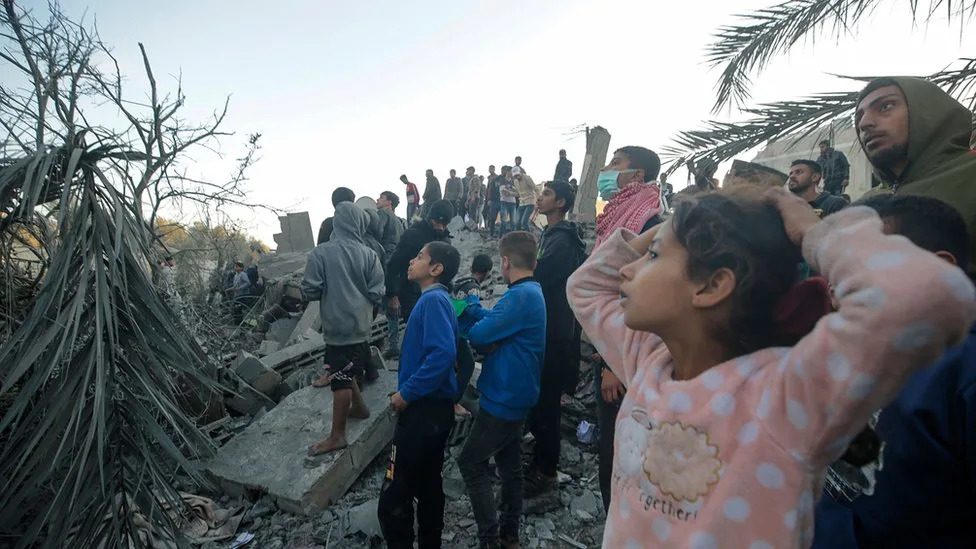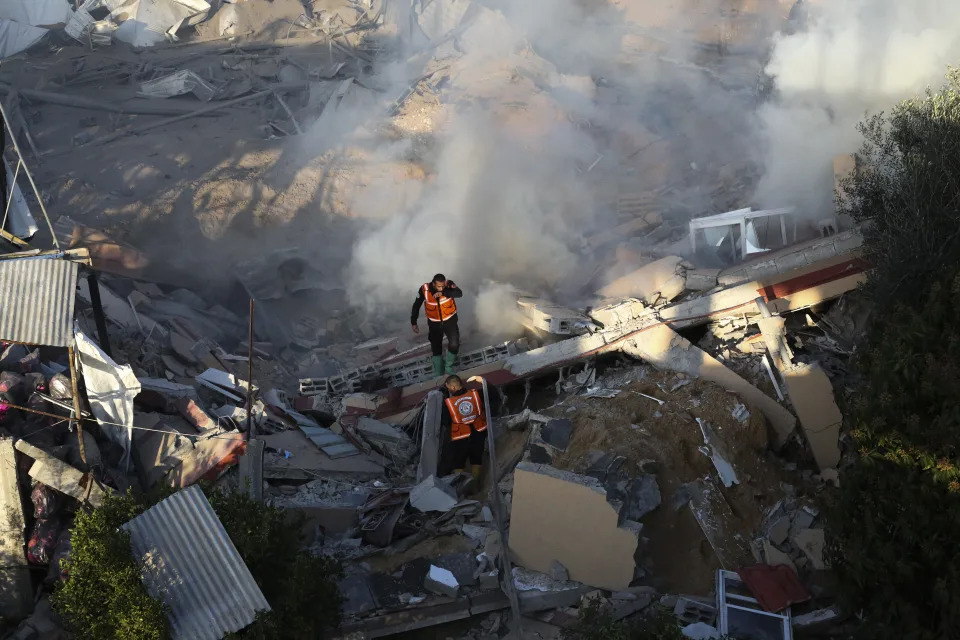China has sharply criticised the US for vetoing a UN Security Council resolution demanding an immediate ceasefire in Gaza.
Palestinians search for bodies and survivors after Israeli air strikes in southern Gaza on Tuesday.
Beijing said the move sent the "wrong message" and effectively gave a "green light to the continued slaughter".
The White House said the Algerian-proposed resolution would "jeopardise" talks to end the war.
The US has proposed its own temporary ceasefire resolution, which also warned Israel not to invade the city of Rafah.
There has been widespread condemnation of the US decision to block Algeria's resolution as fighting continued in Gaza. It was backed by 13 of the 15 members of the UN Security Council - with the UK abstaining.
In response to the veto, China's UN ambassador Zhang Jun said the claim the motion would interfere with ongoing diplomatic negotiations was "totally untenable".
"Given the situation on the ground, the continued passive avoidance on an immediate ceasefire is nothing different from giving a green light to the continued slaughter," he said.
"The spill-over of the conflict is destabilising the entire Middle East region leading to rising risk of a wider war," he added.
"Only by extinguishing the flames of war in Gaza can we prevent the fires of hell from engulfing the entire region."
Algeria's top UN diplomat declared that "unfortunately the Security Council failed once again". "Examine your conscience, how will history judge you," Amar Bendjama added.
US allies were also critical of the move. France's UN envoy Nicolas de Rivière expressed regret that the resolution had not been adopted "given the disastrous situation on the ground".
Linda Thomas-Greenfield, Washington's ambassador to the UN, said it was not the right time to call for an immediate ceasefire while negotiations between Hamas and Israel were continuing.
Her UK counterpart, Barbara Woodward, said the plan could "actually make a ceasefire less likely" by endangering talks.
Israel launched its operations in Gaza following an attack by Hamas on southern Israel on 7 October, during which about 1,200 people were killed and more than 240 others taken hostage.
The Israeli military campaign has left more than 29,000 people dead in Gaza, according to the Palestinian territory's Hamas-run health ministry.
The draft resolution proposed by the US calls for a temporary ceasefire "as soon as practicable" and on the condition that all hostages are released, as well as urging barriers on aid reaching Gaza to be lifted.
The White House has previously avoided the word "ceasefire" during UN votes on the war, but it is unclear if or when the Security Council will vote on the proposal.
It also states a major ground offensive in Rafah would result in more harm to civilians and their further displacement, including potentially into neighbouring countries - a reference to Egypt.
But Israel's Prime Minister Benjamin Netanyahu said on Tuesday he was "committed to continuing the war until we achieve all of its goals" and no pressure could change it.
More than a million displaced Palestinians - about half of the Strip's population - are crammed into Rafah after being forced to seek shelter there. The southern city, which borders Egypt, was home to only 250,000 people before the war.
Many of the displaced are living in makeshift shelters or tents in squalid conditions, with scarce access to safe drinking water or food.
The UN has issued its own warning that a planned Israeli offensive in the city could lead to a "slaughter". The Israeli military has previously insisted it only targets Hamas fighters.
Israeli war cabinet member Benny Gantz has warned the ground assault will be launched unless Hamas frees all its hostages by 10 March.
Qatar says Hamas confirms receipt of medical supplies for Gaza hostages
Qatar's foreign ministry spokesman Majed Al-Ansari, speaks during a weekly press briefing at the Ministry of Foreign Affairs in Doha
Hamas has confirmed receipt of a shipment of medicines under a deal brokered by Qatar and has begun delivering the supplies to hostages held in Gaza, Qatar's foreign ministry spokesperson said in a statement on Tuesday.
Qatar and France brokered a deal with Israel and Hamas last month on the delivery of urgent medication to hostages held by the militant group in Gaza in return for humanitarian and medical aid for the most vulnerable civilians in the enclave.
"Qatar received these confirmations as the mediator in the agreement, which includes the entry of the medicines and shipment of humanitarian aid to civilians in the Gaza Strip, especially in the most affected and damaged areas, in exchange for delivering the medicines needed by hostages in the sector," Qatar's foreign ministry spokesman, Majed Al-Ansari, said in a statement.
More than 29,000 Palestinians have been killed in Israel-Hamas war, Gaza Health Ministry says
Israel’s assault in Gaza has killed more than 29,000 Palestinians since Oct. 7, the territory’s Health Ministry said Monday, marking another grim milestone in one of the deadliest and most destructive military campaigns in recent history.
Israeli Prime Minister Benjamin Netanyahu has vowed to continue the offensive until “total victory” against Hamas after the militants’ Oct. 7 attack on Israeli communities. He and the military have said troops will move soon into the southernmost town of Rafah on the Egyptian border, where over half of Gaza’s 2.3 million people have sought refuge from fighting elsewhere.
The United States, Israel’s top ally, says it is still working with mediators Egypt and Qatar to try to broker another cease-fire and hostage release agreement. But those efforts appear to have stalled in recent days, and Netanyahu angered Qatar by calling on it to pressure Hamas and suggesting it funds the militant group.
The conflict has also brought near daily exchanges of fire between Israel and Lebanon’s Hezbollah militant group that frequently threaten to escalate.
Israeli warplanes on Monday carried out at least two strikes near the southern port city of Sidon in one of the largest attacks near a major city, wounding 14 people, Lebanese state media said. The Israeli military said it attacked Hezbollah arms depots near Sidon in retaliation for a drone that exploded in an open field near the northern Israeli city of Tiberias earlier Monday.
In Gaza, the Health Ministry said the death toll had risen to 29,092 since the start of the war, around two-thirds of them women and children. More than 69,000 Palestinians have been wounded, overwhelming the territory’s hospitals, less than half of which are even partially functioning. The ministry does not distinguish between civilians and combatants in its count.
The war began when Hamas-led militants stormed into southern Israel from Gaza on Oct. 7, killing some 1,200 people, mostly civilians, and taking around 250 men, women and children hostage. After a round of exchanges for Palestinians imprisoned by Israel in November, around 130 remain captive, a fourth of them believed to be dead.
The Israeli military released a video Monday showing what is believed to be the youngest hostage, his brother and mother being led through the streets of the southern Gaza city of Khan Younis soon after their kidnapping on Oct. 7.
The video provides evidence that Shiri Bibas and her two young boys, Ariel, 4, and Kfir, who was 9 months old at the time, survived the initial kidnapping. The boys are the only children who remain in captivity, along with their mother.
Rear Adm. Daniel Hagari, the military’s chief spokesman, said the army is “very concerned” about the family’s wellbeing. He said the army found the videos in security cameras seized during its offensive in Khan Younis.
The video appears to show Bibas, wrapped in a blanket, being led through a dirt street by her captors as she carries Ariel. The military said it believed that Kfir was in a baby sling and could not be seen under the blanket.
The infant with red hair and a toothless smile has become a symbol across Israel for the helplessness and anger over the hostages still held in Gaza. Their father, Yarden Bibas, is also still in captivity.
In a statement, the extended Bibas family said the videos “tear our hearts out.” They made a desperate plea for negotiations to release all of the hostages. In January, the family and hundreds of activists marked Kfir’s first birthday in what his family called “the saddest birthday party in the world.”
With thousands of Palestinians detained by Israel since the war began, an Israeli human rights group reported that Palestinians inside Israeli prisons face daily violence from guards, who enter cells and beat inmates with batons, kicks and fists without provocation in abuse it said could amount to torture. Physicians for Human Rights—Israel said in a report Monday that detainees reported guards urinating on them and forcing them to kiss the Israeli flag and to strip. Prisoners are also held in overcrowded cells and deprived of water for long periods, it said.
The U.N. High Commissioner for Human Rights expressed concern about hundreds of Palestinian women and girls in Israeli detention. It said there were credible reports that at least two were raped, and others “subjected to multiple forms of sexual assault,” including being stripped naked and searched by male officers and being photographed “in degrading circumstances.”
Israel says it has killed over 10,000 Palestinian militants but has provided no evidence for its count. The military says it tries to avoid harming civilians and blames the high death toll on Hamas because the militant group fights in dense residential neighborhoods. The military says 236 of its soldiers have been killed since the start of the ground offensive in late October.
On Sunday, Benny Gantz, a member of Netanyahu’s three-man War Cabinet, warned that the offensive would expand to Rafah if the hostages are not freed by the start of the Muslim holy month of Ramadan, expected around March 10.
Israel has said it is developing plans to evacuate civilians from Rafah, but it’s not clear where they would go in the devastated territory, large areas of which have been flattened. Egypt has sealed the border and warned that any mass influx of Palestinians could threaten its decades-old peace treaty with Israel.
Already, the war has driven around 80% of the Palestinians in Gaza from their homes and has left a quarter of the population starving, according to U.N. officials.
The United States says it is still pushing for a truce and hostage-release, and that it would veto a U.N. Security Council resolution calling for an immediate cease-fire because it conflicts with those efforts.
In an interview with Al-Jazeera, a senior official in Hamas, Khalil al-Haya, repeated the group's demands for releasing the remaining hostages — an end to Israel's assault, the withdrawal of its troops from Gaza and the release of hundreds of Palestinian prisoners, including top militants. He also said regional stability hinges on the establishment of a fully sovereign Palestinian state — though he did not specify what its borders should be.
Netanyahu has rejected Hanas' demands. In a speech before American Jewish leaders on Sunday, he said pressure should be applied on Qatar, which played a key role in mediating last year’s cease-fire and hostage release deal.
“Qatar can press Hamas as no one else can. They host Hamas leaders, Hamas is dependent on them financially,” Netanyahu said. “I urge you to press Qatar to press Hamas because we want our hostages released.”
Majed al-Ansari, Qatar’s foreign ministry spokesperson, dismissed Netanyahu’s remarks as “a new attempt to stall and prolong the war for reasons that have become obvious to everyone,” alluding to the Israeli leader’s domestic political troubles.
Qatar denies funding Hamas and says its provision of aid to Gaza in recent years was carried out in full coordination with Israel, the U.S. and other parties.
“The Israeli prime minister knows very well that Qatar has been committed from day one to mediation efforts, ending the crisis and freeing the hostages,” al-Ansari said.
US draft resolution calls for temporary cease-fire
More than four months since Hamas terrorists invaded Israel on Oct. 7, the Israeli military continues its bombardment of the neighboring Gaza Strip.
The conflict, now the deadliest between the warring sides since Israel's founding in 1948, shows no signs of letting up soon and the brief cease-fire that allowed for over 100 hostages to be freed from Gaza remains a distant memory.
Latest Developments
Feb 20, 2:21 PM
Hostages held in Gaza have received medicine, Qatar says
Qatari officials said hostages held by Hamas in Gaza have received the medication that was part of a deal brokered last month.
The Israeli Prime Minister's Office said it has asked Qatar for evidence that the medicine was delivered.
"Israel will examine the credibility of the report and will continue to work for the peace of our abductees," the office said in a statement.
Feb 20, 12:22 PM
US draft resolution calls for temporary cease-fire
The U.S. voted against a resolution calling for an immediate cease-fire at Wednesday’s United Nations Security Council meeting, The Associated Press reported.
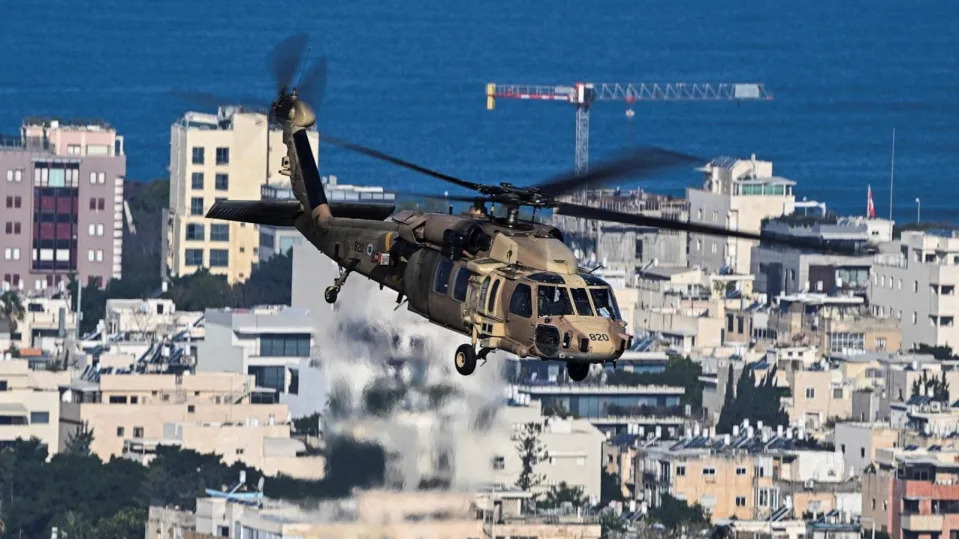
The U.S. was the only nation of the 15 permanent Security Council members to vote against the measure, according to the AP.
U.S. Ambassador to the U.N. Linda Thomas-Greenfield said "an unconditional cease-fire without any obligation for Hamas to release hostages" was irresponsible.
"While we cannot support a resolution that would put sensitive negotiations in jeopardy, we look forward to engaging on a text that we believe will address so many of the concerns we all share -- a text that can and should be adopted by the council, so that we can have a temporary cease-fire as soon as practicable, based on the formula of all hostages being released," she said.
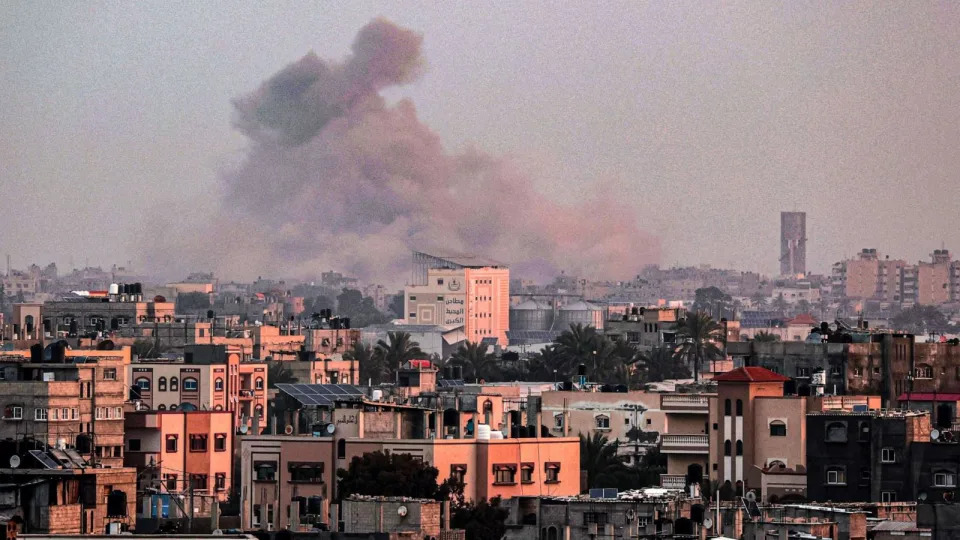
The U.S. has been circulating its own draft resolution on Gaza that calls for a temporary cease-fire conditioned on the release of all hostages, while also condemning Hamas for the Oct. 7 attack that sparked the war, according to senior administration officials familiar with the matter.
If the proposal were to be adopted by the U.N. Security Council, it would mark the first time the body has formally condemned Hamas’ actions.
The officials say the draft also makes clear "that under current circumstances a major ground offensive into Rafah should not proceed" and that there can be no reduction in territory in the Gaza Strip or any forced displacement of Palestinians, while also calling on Israel "to lift all barriers to the provision of humanitarian assistance, open additional humanitarian routes, and to keep current crossings open."
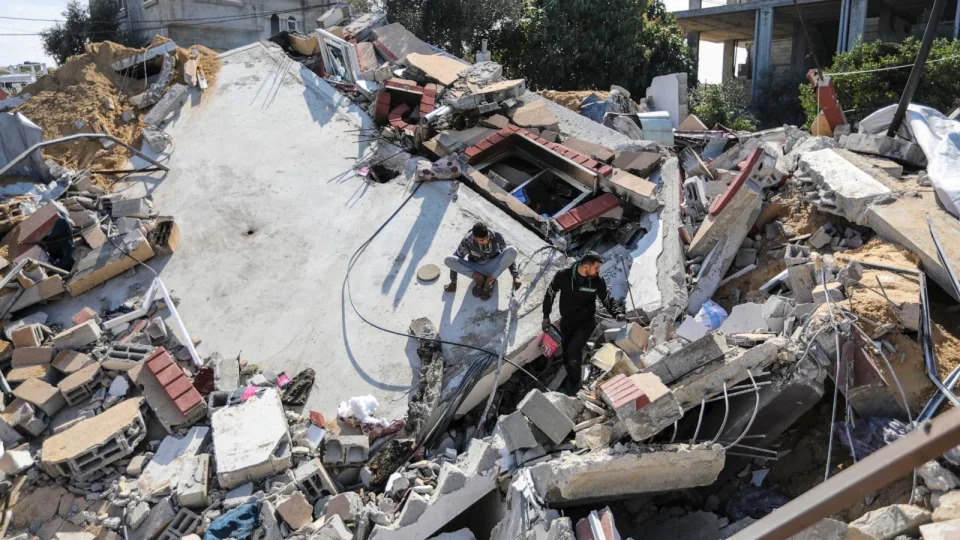
The senior officials signaled that American diplomats wouldn’t rush the text to a vote and that they intended on "allowing time for negotiations."
While hostage talks have sputtered over the past couple of weeks, senior administration officials said they were making some progress.
"The differences between the parties, they have been narrowed. They haven’t been sufficiently narrowed to get us to a deal, but we are still hopeful and we are confident that there is the basis for an agreement between the parties," one official said.
Feb 20, 11:07 AM
IDF operating inside Al-Amal Hospital
Israeli forces, which already entered Gaza’s Nasser Hospital, are also now operating inside the nearby Al-Amal Hospital, the Israel Defense Forces confirmed to ABC News.
"Al-Amal Hospital is currently under multiple attacks, as Israeli forces have directly targeted the third floor of the hospital, resulting in the burning of two rooms," and "the hospital’s water lines were targeted," the Palestine Red Crescent Society said.
Over 8,000 patients were evacuated from the hospital earlier this month, but almost 100 patients still remain inside, the Palestine Red Crescent Society said.
Feb 20, 7:13 AM
WHO helps transfer 32 critical patients out of Gaza's besieged Nasser Hospital
The World Health Organization said Tuesday that it has helped to successfully transfer 32 critically ill patients, including two children, from besieged Nasser Hospital in the southern Gaza Strip.
The WHO said its staff led two "life-saving," "high-risk" missions at the medical complex in Khan Younis on Sunday and Monday, in close partnership with the Palestine Red Crescent Society and the United Nations Office for the Coordination of Humanitarian Affairs, "amid ongoing hostilities and access restrictions." Staff at Nasser Hospital had requested the transfer of patients after the facility became "non-functional" following an Israeli military raid on Feb. 14 after a weeklong siege, according to the WHO.
"Weak and frail patients were transferred amidst active conflict near the aid convoy," the WHO said in a statement. "Road conditions hindered the swift movement of ambulances, placing the health of patients at further risk."
"Nasser Hospital has no electricity or running water, and medical waste and garbage are creating a breeding ground for disease," the organization added. "WHO staff said the destruction around the hospital was 'indescribable.' The area was surrounded by burnt and destroyed buildings, heavy layers of debris, with no stretch of intact road."
The WHO estimates that 130 sick and injured patients and at least 15 doctors and nurses remain inside Nasser Hospital. As the facility's intensive care unit was no longer functioning, the only remaining ICU patient was transferred to a different part of the complex where other patients are receiving basic care, according to the WHO.
"WHO fears for the safety and well-being of the patients and health workers remaining in the hospital and warns that further disruption to lifesaving care for the sick and injured would lead to more deaths," the organization said. "Efforts to facilitate further patient referrals amidst the ongoing hostilities are in process."
Prior to the missions on Sunday and Monday, the WHO said it "received two consecutive denials to access the hospital for medical assessment, causing delays in urgently needed patient referral." At least five patients reportedly died in Nasser Hospital's ICU before any missions or transfers were possible, according to the WHO.
Nasser Hospital is the main medical center serving southern Gaza. Ground troops from the Israel Defense Forces stormed the facility last week, looking for members of Hamas who the IDF alleges have been conducting military operations out of the hospital. Hamas, the Palestinian militant group that governs Gaza and is at war with neighboring Israel, denies the claims.
"The dismantling and degradation of the Nasser Medical Complex is a massive blow to Gaza's health system," the WHO said. "Facilities in the south are already operating well beyond maximum capacity and are barely able to receive more patients."
Feb 20, 7:08 AM
Aid groups warn of 'explosion in preventable child deaths' in Gaza
A new analysis by the Global Nutrition Cluster, a humanitarian aid partnership led by the United Nations International Children's Emergency Fund, found that 90% of children under the age of 2 in the war-torn Gaza Strip face severe food poverty, meaning they eat two or fewer food groups a day.
The same was true for 95% of pregnant and breastfeeding women in Gaza, according to the report released Monday. And at least 90% of children under 5 are affected by one or more infectious disease, with 70% experiencing diarrhea in the past two weeks, the report said.
In Gaza's southernmost city of Rafah, where most humanitarian aid enters, 5% of children under 2 are acutely malnourished, compared to more than 15% in northern Gaza, which has been isolated by the Israeli military and almost completely cut off from aid for weeks, the report said. Before war broke out last October between Israel and Gaza's militant rulers, Hamas, the acute malnutrition rate across the coastal enclave was less than 1%, according to the report.
The report also found that more than 80% of homes in Gaza lack clean and safe water, with the average household having one liter per person per day.
"The Gaza Strip is poised to witness an explosion in preventable child deaths which would compound the already unbearable level of child deaths in Gaza," Ted Chaiban, deputy executive director for humanitarian action and supply operations at UNICEF, said in a statement. "We've been warning for weeks that the Gaza Strip is on the brink of a nutrition crisis. If the conflict doesn't end now, children’s nutrition will continue to plummet, leading to preventable deaths or health issues which will affect the children of Gaza for the rest of their lives and have potential intergenerational consequences."
Feb 19, 12:31 PM
Gaza's health ministry accuses IDF of turning Nasser Hospital into 'military barracks'
Israeli troops have turned Nasser Hospital, the main medical center serving the southern Gaza Strip, into a "military barracks" and are "endangering the lives of patients and medical staff," according to Gaza's Hamas-run Ministry of Health.
The health ministry said Monday that patients and medical staff inside Nasser Hospital are now without electricity, water, food, oxygen and treatment capabilities for difficult cases since Israeli ground troops raided the facility in the southern Gaza city of Khan Younis last week.
The World Health Organization, which warned on Sunday that Nasser Hospital "is not functional anymore," said more than 180 patients and 15 doctors and nurses remain inside the hospital.
The WHO said it has evacuated 14 critical patients from the hospital to receive treatment elsewhere.
The Israel Defense Forces alleges that Hamas, the Palestinian militant group that governs Gaza, has been conducting military operations out of Nasser Hospital and other medical centers in the war-torn enclave -- claims which Hamas denies.
Feb 19, 12:24 PM
IDF strikes Hezbollah weapon storage facilities, terrorist infrastructure
The Israel Defense Forces said its fighter jets hit two Hezbollah weapons storage facilities in Lebanon on Monday.
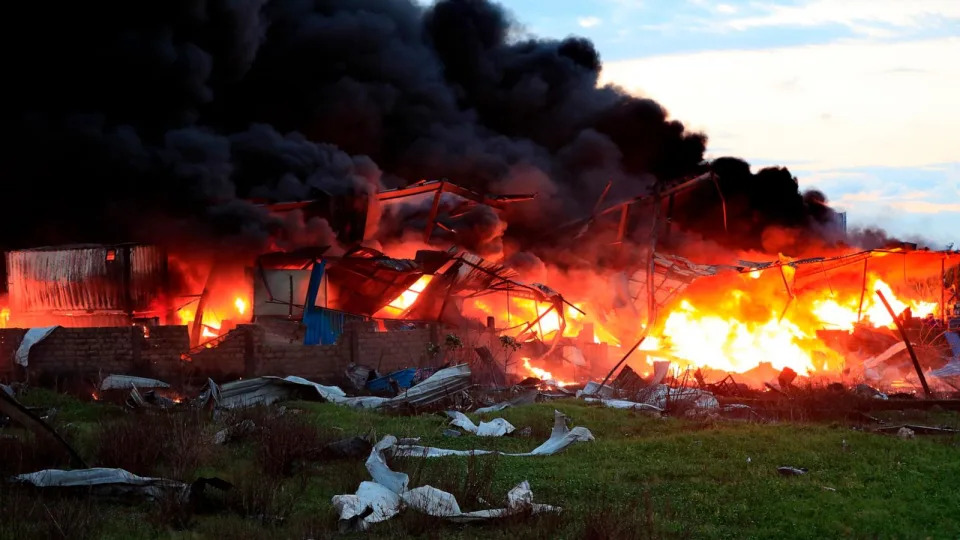
The IDF said this was in response to the unmanned aerial vehicle launched toward northern Israel earlier in the day, and the Israelis believe it was most likely launched from Lebanon by Hezbollah.
The IDF also said its fighter jets have struck some Hezbollah terrorist infrastructure in Lebanon on Monday.
Feb 19, 11:24 AM
IDF arrests 200 suspects at Nasser Hospital in southern Gaza
The Israel Defense Forces said Monday that it has arrested 200 suspects at Nasser Hospital in the city of Khan Younis in the southern Gaza Strip.
Gaza's Hamas-run Ministry of Health said Monday that the IDF arrested medical staff at Nasser Hospital, including the director and the only doctor responsible for caring for patients in the intensive care unit.
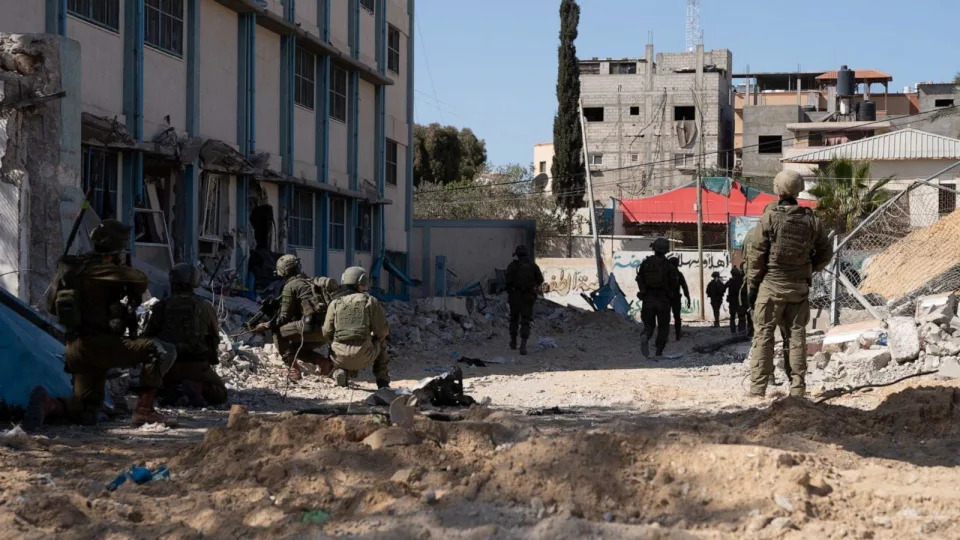
Israeli ground forces stormed the hospital last week, looking for members of Hamas who the IDF alleges have been conducting military operations there. Hamas, the Palestinian militant group that governs Gaza, has denied the allegations.
Nasser Hospital is the main medical center serving southern Gaza and was -- until now -- the only fully functioning hospital in the war-torn enclave. The World Health Organization said Sunday that Nasser Hospital "is not functional anymore" after Israeli troops raided the facility.
Feb 19, 4:46 AM
IDF continues ground operations in Khan Younis
The Israel Defense Forces said Monday morning that its ground troops and special forces are "continuing to operate" in the western part of Khan Younis, a city in the southern Gaza Strip.
The IDF said its ground troops conducted "targeted raids on terror targets" in western Khan Younis over the past day, "during which AK-47s, drones, an RPG, explosive devices, and additional military equipment were located." The soldiers on the ground also coordinated with the Israel Air Force's fighter jets overhead to kill "terrorists who were operating adjacent to the troops in the area," according to the IDF.
"During additional activity in western Khan Yunis, IDF ground troops used a drone to identify a terrorist cell that was approaching the troops," the IDF said in a statement. "In response, the troops directed an aircraft to eliminate them. A short while after, four additional terrorists were identified in the area, who were also eliminated by an IAF aircraft."
Meanwhile, the IDF said its special forces "encountered armed terrorists, conducted targeted raids on terror targets, seized weapons and directed a helicopter to strike and eliminate an additional terrorist."
Feb 19, 4:11 AM
Medicine for hostages, weapons found at Nasser Hospital, IDF says
The Israel Defense Forces said Sunday that boxes of medicine intended for Israeli hostages, a large number of weapons and a vehicle belonging to a kibbutz that was attacked by Hamas terrorists on Oct. 7 were found during a raid at Nasser Hospital in the southern Gaza Strip.
The IDF said its soldiers located "medicines specifically designated for the Israeli hostages in Gaza, large quantities of weapons and a vehicle belonging to Kibbutz Nir Oz" during its operations in Nasser Hospital in the city of Khan Younis.
The IDF said it also apprehended "hundreds of terrorists and other suspects who were hiding in the Nasser Hospital, some posing as medical staff."
"Boxes of medicine were found with the names of Israeli hostages on them. The packages of medicine that were found were sealed and had not been transferred to the hostages," the IDF said.



